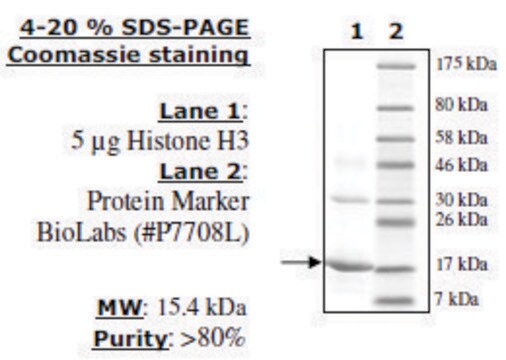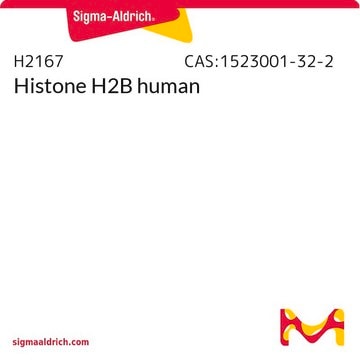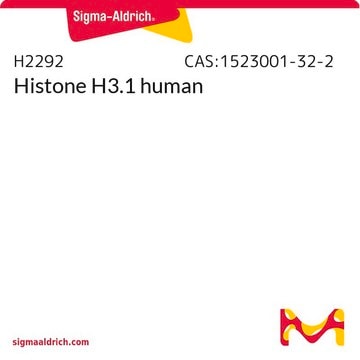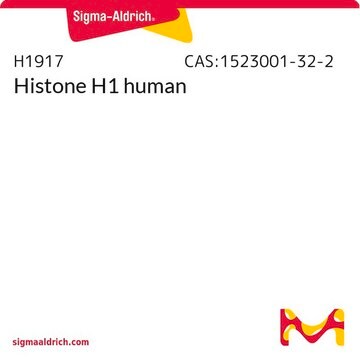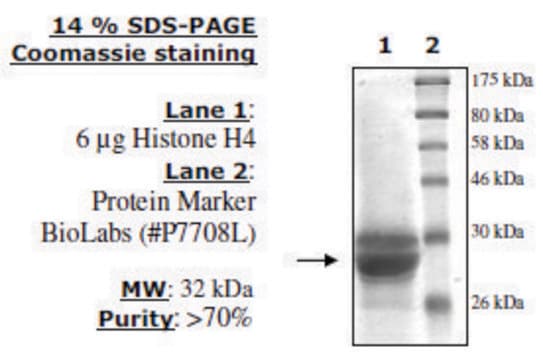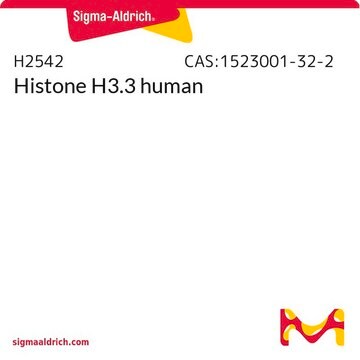13-107
Core Histones
Highly pure core histones proteins (H2A, H2B, H3 and H4) including H1 purified from chicken erythrocytes, suitable as a substrate for histone modification assays (HAT, HDAC, DNMT) and nucleosome assembly studies.
Synonyme(s) :
Core Histone Proteins
Se connecterpour consulter vos tarifs contractuels et ceux de votre entreprise/organisme
About This Item
Code UNSPSC :
12352200
eCl@ss :
32160405
Nomenclature NACRES :
NA.32
Produits recommandés
Source biologique
chicken
Fabricant/nom de marque
Upstate®
Technique(s)
activity assay: suitable (histone acetyltransferase (HAT))
Conditions d'expédition
dry ice
Description générale
Histones are a family of basic proteins that associate with DNA in the nucleus and help condense it into chromatin. Some histones function as spools for the thread-like DNA to wrap around forming a nucleosome. Each nucleosome is made of DNA wrapped around eight histone proteins that function like a spool and are called a histone octamer. Each histone octamer is composed of two copies each of the histone proteins H2A, H2B, H3, and H4. The chain of nucleosomes is then wrapped into a 30 nm spiral called a solenoid, where additional H1 histone proteins are associated with each nucleosome to maintain the chromosome structure.
Application
Core histones and histone H1, purified from chicken erythrocytes; suitable as a substrate for HAT assays; purity = 90%
Qualité
rountinely evaluated by immunoblot using Anti-Histone H3 (05-499) and Anti-Histone H4 (07-108)
Forme physique
Lyophilized
Stockage et stabilité
Lyophilized: 2 years at -20°C; Rehydrated: 6 months at -70°C
Informations légales
UPSTATE is a registered trademark of Merck KGaA, Darmstadt, Germany
Clause de non-responsabilité
Unless otherwise stated in our catalog or other company documentation accompanying the product(s), our products are intended for research use only and are not to be used for any other purpose, which includes but is not limited to, unauthorized commercial uses, in vitro diagnostic uses, ex vivo or in vivo therapeutic uses or any type of consumption or application to humans or animals.
Code de la classe de stockage
11 - Combustible Solids
Classe de danger pour l'eau (WGK)
WGK 2
Point d'éclair (°F)
Not applicable
Point d'éclair (°C)
Not applicable
Certificats d'analyse (COA)
Recherchez un Certificats d'analyse (COA) en saisissant le numéro de lot du produit. Les numéros de lot figurent sur l'étiquette du produit après les mots "Lot" ou "Batch".
Déjà en possession de ce produit ?
Retrouvez la documentation relative aux produits que vous avez récemment achetés dans la Bibliothèque de documents.
Les clients ont également consulté
Analysis of nuclear receptor acetylation.
Chenguang Wang,Michael Powell,Lifeng Tian,Richard G Pestell
Methods in Molecular Biology null
1-Aminoindan-1,5-dicarboxylic acid and (S)-(+)-2-(3'-carboxybicyclo[1.1.1] pentyl)-glycine, two mGlu1 receptor-preferring antagonists, reduce neuronal death in in vitro and in vivo models of cerebral ischaemia.
D E Pellegrini-Giampietro,A Cozzi,F Peruginelli,P Leonardi,E Meli,R Pellicciari,F Moroni
The European Journal of Neuroscience null
AtFKBP53 is a histone chaperone required for repression of ribosomal RNA gene expression in Arabidopsis.
Hong Li,Sheng Luan
Cell research null
Human erythropoietin-specific sites of monoclonal antibody-mediated neutralization.
M R Fibi,M Aslan,P Hintz-Obertreis,J U Pauly,M Gerken,G Luben,L Lauffer,B Siebold,W Stuber,G Nau
Blood null
Rocío Montes de Oca et al.
The Journal of biological chemistry, 280(51), 42252-42262 (2005-10-06)
Barrier to autointegration factor (BAF) is an essential conserved double-stranded DNA-binding protein in metazoans. BAF binds directly to LEM domain nuclear proteins (e.g. LAP2, Emerin, and MAN1), lamin A, homeodomain transcription factors, and human immunodeficiency virus type 1-encoded proteins. BAF
Notre équipe de scientifiques dispose d'une expérience dans tous les secteurs de la recherche, notamment en sciences de la vie, science des matériaux, synthèse chimique, chromatographie, analyse et dans de nombreux autres domaines..
Contacter notre Service technique
